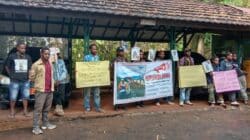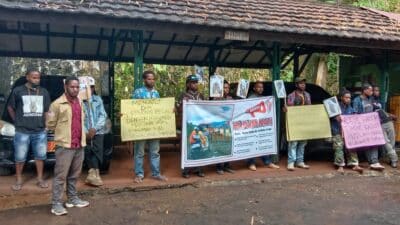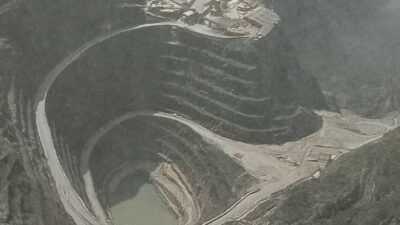Jayapura, Jubi – Activists representing Greenpeace, the Central Kalimantan Legal Aid Institute, Save Our Borneo, and the Indonesian Forum for the Environment in Central Kalimantan have expressed strong dissatisfaction with President Joko Widodo’s apparent disregard for the failures of the food estate project in Tewai Baru Village, Gunung Mas, Central Kalimantan.
The activists parodied Jokowi having lunch with three presidential candidates in the 2024 election, wearing masks of the elite’s faces, depicting the elite’s ignorance on this case as Jokowi had only participated in the COP28 forum in Dubai and made some claims on environmental progress the country is making.
According to Greenpeace Indonesia Forest Campaigner Belgis Habiba, the conditions in the Gunung Mas food estate have not significantly changed since they first documented the project’s failure in November 2022. Despite promises, the cassava plantation, which was expected, remains absent. Moreover, approximately 760 hectares of natural forest have been cleared for this project, affecting both the indigenous communities and the biodiversity that thrived within the forests.
Director of environmental NGO Central Kalimantan Walhi, Bayu Herinata, pointed out that the government’s promotion of biofuel development as part of its strategy is, in their view, a misguided and ineffective approach that fails to demonstrate a genuine commitment to climate action. This approach, they argued, could potentially lead to the expansion of monoculture plantations, further exacerbating deforestation and environmental degradation.
Bayu also highlighted the encroachment of the food estate project into peat areas in Kapuas and Pulang Pisau districts, which, according to their observations, has escalated peat damage and triggered fires in 2023.
“We urge the government to cease the expansion of food estates. They are a false solution to achieving food security and need to be evaluated. Restoration of damaged forests and peatlands are also very much needed,” Bayu said.
Save Our Borneo Executive Director Muhamad Habibi stressed that the key to food security lies in indigenous wisdom and practices, particularly through ecological agriculture and traditional agroforestry, as historically practiced by the Dayak indigenous people in Kalimantan.
“The food estate project lacks community involvement in its design and implementation, neglecting the crucial role of local communities in sustainable agricultural practices,” said Habibi.
Palangkaraya Legal Aid Institute Director Aryo Nugroho voiced concerns about the project’s disregard for the rights of both present and future generations, emphasizing the potential environmental damage caused by the food estate initiatives. Aryo argued that these projects not only neglect the rights of future generations but also marginalize the indigenous farming culture, describing it as potentially leading to the erosion of indigenous heritage. (*)














